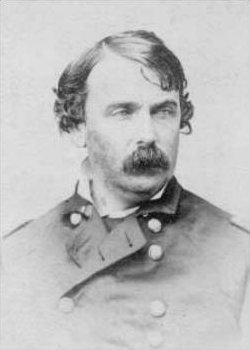His eyes were shut ‘with a tightness preternatural’
By BERRY CRAIG
(October 12, 2012)- On this date in 1862, members of Congress were mourning the loss of one of their own, a western Kentuckian who perished in the bloodiest battle ever fought in the Bluegrass State.
 Yankee Brigadier General James S. Jackson of Hopkinsville was among about 7,500 Union and Confederate soldiers killed at the Battle of Perryville on Oct. 8, 1862. Yankee Brigadier General James S. Jackson of Hopkinsville was among about 7,500 Union and Confederate soldiers killed at the Battle of Perryville on Oct. 8, 1862.
Gen. Don Carlos Buell’s Yankee army and Gen. Braxton Bragg’s Rebel forces fought each other to a standstill. But the clash of arms is considered a Union victory because Bragg retreated from Kentucky, thus all but ending Confederate hopes of prying the loyal state out of the Union by force.
Jackson had been elected to the House of Representatives on the Union ticket in June, 1861. But he wanted to do more in the Civil War than pass laws and make patriotic speeches.
He was one of several lawmakers who resigned to don Union blue. But he was evidently the only one who died in combat.
Jackson was 39 when a Rebel bullet cut short his life.
“Well, I’ll be damned if this is not getting rather particular,” were his reputed last words, or close to his last words.
The mustachioed Jackson became upset when he saw some of his men retreat. Noticing one of their officers on horseback, the general warned him to dismount, lest he be killed. But it was Jackson who soon fell, shot through the chest.
A Woodford County native, Jackson also had been in the Mexican-American War, where he battled more than Mexican soldiers. First Lieutenant Jackson fought a duel with Captain Thomas F. Marshall, a fellow Kentucky officer. Neither man was hurt, but Jackson reportedly left the army to avoid a court-martial. (Marshall went on to serve in Congress before the Civil War.)
After the war, he became an attorney and practiced in Greenup before migrating to Hopkinsville in 1855. Like most Christian countians, he embraced the Union cause.
Jackson soon stepped away from his congressional seat to recruit men for the Third Kentucky Cavalry, which mustered into Union service at Calhoun, the McLean County seat. Most of the men came from Pennyrile counties, including Christian.
Jackson became colonel of the Third Kentucky and led the regiment in the Battle of Shiloh in April, 1862. Later, he earned a brigadier’s star under Lincoln’s “policy of rewarding loyal border-state politicians with higher rank, whatever their military qualifications,” according to Generals in Blue by Ezra J. Warner.
Warner wrote that Jackson evidently deserved promotion. The soldier-politician ended up leading an infantry division at the Perryville fight.
The Boyle County battleground is a state historic site. The 150th anniversary of the battle was marked at the park last weekend.
Jackson died on a hilltop near a Union artillery battery, according to Kurt Holman, site manager. “Apparently, he was on foot,” Holman added.
Col. Samuel M. Starling, also of Hopkinsville, and others rushed to Jackson when he was shot, according to Perryville: This Grand Havoc of Battle by Kenneth Noe.
His comrades-in-arms were too late. Starling found Jackson’s “eyes…closed, with a tightness preternatural.” The bullet that killed him tore “a hole in his coat surrounded by blood ½ inch all around it,” the colonel reported.
Jackson was buried in Cave Hill Cemetery in Louisville. But in 1863, his remains were transferred to Riverside Cemetery in Hopkinsville. A state historical marker near the graveyard entrance commemorates his service as a congressman and Union general and "his untimely death."
-- Berry Craig is a professor of history at West Kentucky Community and Technical College in Paducah and is the author of True Tales of Old-Time Kentucky Politics: Bombast, Bourbon and Burgoo, Hidden History of Kentucky in the Civil War, Hidden History of Kentucky Soldiers and Hidden History of Western Kentucky. The books are being sold to raise money for scholarships at WKCTC. They are available by contacting Craig by phone at (270) 534-3270 or by email at berry.craig@kctcs.edu. |


 Yankee Brigadier General James S. Jackson of Hopkinsville was among about 7,500 Union and Confederate soldiers killed at the Battle of Perryville on Oct. 8, 1862.
Yankee Brigadier General James S. Jackson of Hopkinsville was among about 7,500 Union and Confederate soldiers killed at the Battle of Perryville on Oct. 8, 1862.



